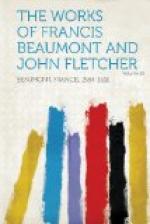To weare just Robes, and leave off Trunk-hose-Wit.
Now, now ’twas Perfect; None must looke for New,
Manners and Scenes may alter, but not You;
For Yours are not meere Humours, gilded straines;
The Fashion lost, Your massy Sense remaines.
Some thinke Your Witts of two Complexions fram’d,
That One the Sock, th’Other the Buskin claim’d;
That should the Stage embattaile all it’s Force,
FLETCHER would lead the Foot, BEAUMONT the Horse.
But, you were Both for Both; not Semi-witts,
Each Piece is wholly Two, yet never splits:
Y’are not Two Faculties (and one Soule still)
But th’ Understanding, Thou the quick free Will;
But, as two Voyces in one Song embrace,
(FLETCHER’S keen Trebble, and deep BEAUMONTS Base)
Two, full, Congeniall Soules; still Both prevail’d;
His Muse and Thine were Quarter’d not Impal’d:
Both brought Your Ingots, Both toil’d at the Mint,
Beat, melted, sifted, till no drosse stuck in’t,
Then in each Others scales weighed every graine,
Then smooth’d and burnish’d, then weigh’d all againe,
Stampt Both your Names upon’t by one bold Hit,
Then, then’twas Coyne, as well as Bullion-Wit.
Thus Twinns: But as when
Fate one Eye deprives,
That other strives to double which survives:
So_ BEAUMONT dy’d: yet left
in Legacy
His Rules and Standard-wit (FLETCHER)
to Thee.
Still the same Planet, though not fill’d
so soon,
A Two-horn’d Crescent then,
now one Full-moon.
Joynt Love before, now Honour
doth provoke;
So th’ old Twin-Giants forcing
a huge Oake
One slipp’d his footing, th’
Other sees him fall,
Grasp’d the whole Tree and single
held up all.
Imperiall FLETCHER! here begins
thy Raigne,
Scenes flow like Sun-beams from thy glorious
Brain;
Thy swift dispatching Soule no more doth
stay
Then He that built two Citties in one
day;
Ever brim full, and sometimes running
o’re
To feede poore languid Witts that waite
at doore,
Who creep and creep, yet ne’re above-ground
stood,
(For Creatures have most Feet which have
least Blood)
But thou art still that Bird of Paradise
Which hath no feet and ever
nobly flies:
Rich, lusty Sence, such as the
Poet ought,
For Poems if not Excellent, are
Naught;
Low wit in Scenes? in state a Peasant
goes;
If meane and flat, let it foot Yeoman
Prose,
That such may spell as are not Readers
grown,
To whom He that writes Wit, shews he hath
none.
Brave Shakespeare flow’d,
yet had his Ebbings too,
Often above Himselfe, sometimes below;
Thou Alwayes Best; if ought seem’d
to decline,




